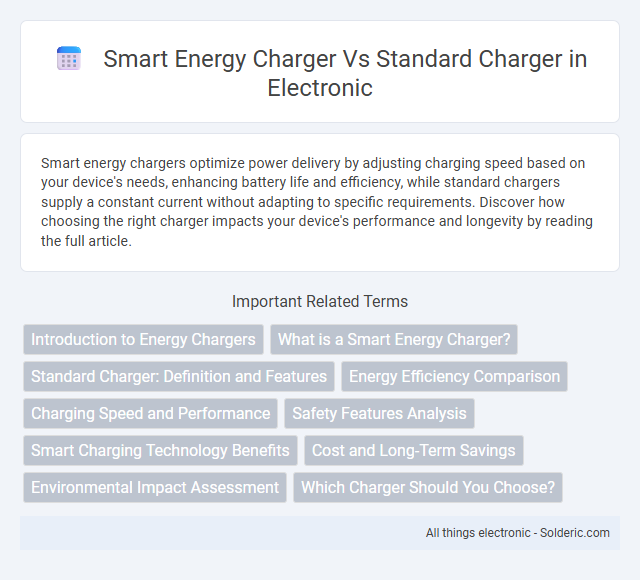Smart energy chargers optimize power delivery by adjusting charging speed based on your device's needs, enhancing battery life and efficiency, while standard chargers supply a constant current without adapting to specific requirements. Discover how choosing the right charger impacts your device's performance and longevity by reading the full article.
Comparison Table
| Feature | Smart Energy Charger | Standard Charger |
|---|---|---|
| Charging Efficiency | High - Optimizes energy use | Moderate - Fixed power output |
| Energy Consumption | Low - Reduces wastage | High - Continuous power draw |
| Charging Speed | Adaptive - Adjusts to device needs | Fixed - Constant rate |
| Smart Features | Yes - Scheduling, monitoring, auto shut-off | No - Basic charging only |
| Cost | Higher initial investment | Lower upfront cost |
| Lifespan Impact | Extends battery life with smart charging | Potential battery degradation over time |
| Compatibility | Wide - Supports multiple device types | Limited - Device-specific |
| Environmental Impact | Eco-friendly - Energy-efficient design | Less efficient - Higher power waste |
Introduction to Energy Chargers
Smart energy chargers optimize electricity usage by adjusting charging speed based on device needs and grid demand, enhancing efficiency and reducing energy costs. Standard chargers provide a fixed output, lacking adaptive features, which can result in longer charging times and higher energy consumption. Your choice of charger impacts not only charging speed but also overall energy management and environmental sustainability.
What is a Smart Energy Charger?
A smart energy charger is an advanced device designed to optimize charging efficiency by using real-time data and adaptive algorithms to regulate power delivery. It monitors battery health, adjusts current flow, and reduces energy waste, extending battery life compared to standard chargers. These chargers often integrate with smart grids and mobile apps, enabling users to schedule charging during off-peak hours for cost savings and reduced environmental impact.
Standard Charger: Definition and Features
A standard charger is a basic electrical device designed to convert AC power from a wall outlet into DC power suitable for charging batteries in devices like smartphones, tablets, and laptops. It typically offers fixed output voltage and current without adaptive charging capabilities, resulting in consistent but slower charging speeds compared to advanced chargers. Standard chargers lack intelligent features such as overcharge protection, temperature control, and automatic power adjustment, making them less efficient and potentially less safe than smart energy chargers.
Energy Efficiency Comparison
Smart energy chargers optimize power delivery by adjusting current based on device requirements, resulting in up to 30% higher energy efficiency compared to standard chargers that provide constant power output. Advanced features like adaptive voltage regulation and real-time load monitoring reduce energy loss and heat generation, extending battery lifespan and decreasing electricity consumption. Studies show smart chargers can lower overall energy use by 15-25% in everyday charging scenarios, making them a sustainable choice for reducing carbon footprint.
Charging Speed and Performance
Smart energy chargers utilize advanced algorithms and adaptive power distribution to optimize charging speed, often reducing charging times by up to 30% compared to standard chargers. They monitor battery conditions and adjust output dynamically, enhancing overall performance and preventing overheating or overcharging. Standard chargers operate at a fixed output rate, resulting in slower charging speeds and less efficient energy management.
Safety Features Analysis
Smart energy chargers incorporate advanced safety features such as overcharge protection, temperature regulation, and short-circuit prevention to enhance battery lifespan and user safety. Standard chargers often lack these sophisticated mechanisms, increasing the risk of overheating, battery damage, and potential hazards. Choosing a smart energy charger ensures your device benefits from precise energy management and reduces safety risks during charging.
Smart Charging Technology Benefits
Smart energy chargers utilize advanced algorithms and real-time data to optimize charging efficiency, reducing energy waste and lowering electricity costs. These chargers support adaptive charging schedules based on user behavior and grid demand, enhancing battery lifespan and minimizing environmental impact. Smart charging technology also enables seamless integration with renewable energy sources, promoting sustainable energy consumption.
Cost and Long-Term Savings
Smart energy chargers typically have a higher upfront cost than standard chargers due to advanced features such as energy monitoring and adaptive charging algorithms. Over time, these smart chargers provide significant long-term savings by reducing electricity consumption, optimizing charging times, and extending battery life. Standard chargers lack these efficiencies, often resulting in higher energy bills and more frequent battery replacements.
Environmental Impact Assessment
Smart energy chargers optimize electricity consumption by adjusting charging patterns based on grid demand and renewable energy availability, significantly reducing carbon emissions compared to standard chargers. Standard chargers consume electricity at a constant rate, often during peak hours when energy is less sustainable, increasing environmental impact. Choosing a smart charger enhances Your sustainability efforts by minimizing energy waste and supporting greener power sources.
Which Charger Should You Choose?
Smart energy chargers optimize power delivery by adjusting charging speed based on device needs, improving battery lifespan and energy efficiency. Standard chargers provide a fixed output, often resulting in slower charging and potential battery wear over time. Choose a smart charger for faster, safer, and more energy-efficient charging, especially for modern devices requiring adaptive power management.
Smart energy charger vs Standard charger Infographic

 solderic.com
solderic.com